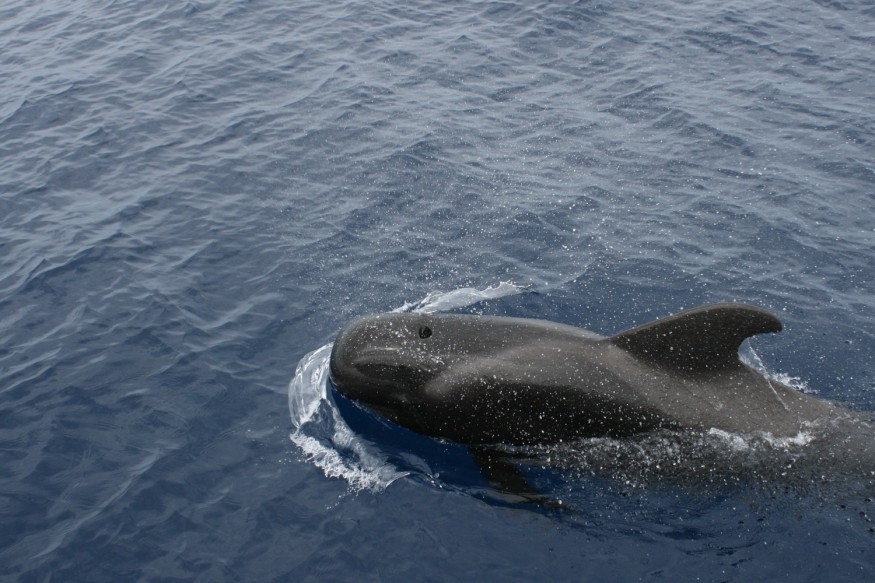Seven northern bottlenose whales were spotted stranded on a beach in Rossnowlagh, County Donegal, on the northwest coast of Ireland. This occurrence is considered to be the largest stranding of live animals in the history of Ireland.
Tide is now coming in on the live stranded Northern Bottlenose Whales. Some stranded and some still in water. All alive but stressed with high breathing rate. IWDG providing some first aid on the beach. NPWS and Donegal County Council on there way to assess situation too. pic.twitter.com/QrH2YgNBdJ — Irish Whale and Dolphin Group (@IWDGnews) August 19, 2020
Six Bottlenose Whales Dead
The Irish Whale and Dolphin Group (IWDG) attempted to help the whales, but it was too late already, as six of them have already died. Only one managed to survive and went back to the sea. Experts believe that its survival rate is low, but Sibeal Regan of the IWDG is 'cautiously optimistic.'
The authorities believed that the acoustic trauma caused by humans perhaps is the reason for the whales to be stranded on the shore.
One whale seen here lifting its head to breathe has refloated itself and swam out with the incoming tide. We are cautiously optimistic it will make it out but IWDG will standby and check to see if it restrands. Video by Nicola Coyle/IWDG pic.twitter.com/8NRzsBPBQu — Irish Whale and Dolphin Group (@IWDGnews) August 19, 2020
Regan said that although the death of the six whales is unfortunate, the only consolation to that is that they are no longer suffering. For the lone survivor, she said its survival is low given that they have come up to the shore when they are naturally deep divers.
IWDG later said that they would remain on the shore just in case the whale gets stranded again.
READ NEXT: How Does a 33-Foot Humpback Whale Drown?
Whales Dying from Acoustic Trauma
Before the seven whales, IWDG warned of a spike in animal strandings. They reported 245 strandings involving 263 animals in 2019 in Ireland. According to the group, many of these animals get entangled in fishnets.
IWDG said that the deaths of the whales always happen when giant fishing vessels arrive. These boats are known as supertrawlers that catch fish near the surface but far enough from the Irish waters in autumn.
The group also reported that a male Sowerby's beaked whale was spotted in distress and died in Wicklow Harbor earlier this year. This type of whale is commonly seen in North Atlantic.
They believe that the whale suffered from acoustic trauma is often caused by human activity. Acoustic trauma includes noise from the boat, ports, and the use of naval radar systems.
These kinds of noises put marine animals in distress, causing some of them to panic dive or be on alert, making them spend more time on the lookout for predators rather than spend it doing essential activities.
In response to these noises, dolphins would change their tune by lowering their frequency and reducing their song variety. At the same time, some whales would stop singing at all, which causes significant communication problems to their pods.

Studies also show that the naval navigation systems commonly used cause the whales and dolphins to flee as it confuses them since they use echolocation for their navigation. This is thought to be the critical reason for whale strandings.
Last December, a sperm whale died after it was washed up on the shore of Scotland. Rescuers found a 220lb ball of trash composed of fishing nets, plastic cups, and bags inside its stomach. Then, in February this year, a 60-foot fin whale died after being stranded on a Cornish beach.
Those are just a few of the reported cases, and more sightings of whale and dolphin strandings are reported this year that perhaps are caused by acoustic trauma by human activities.
READ: Dead Sperm Whale Contains 220-lb of Garbage on its Stomach
Check out more news and information on Environment and Climate on Science Times.
© 2026 ScienceTimes.com All rights reserved. Do not reproduce without permission. The window to the world of Science Times.












